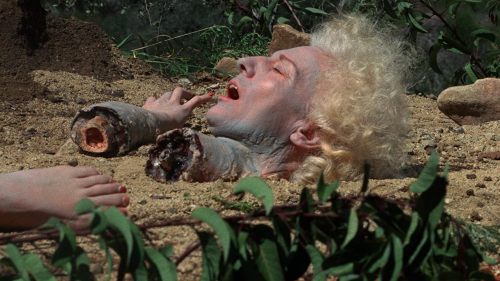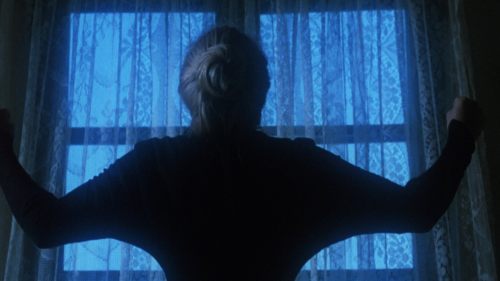Exploitation TV: Volume Four
For cinephiles, the definition of home video label Vinegar Syndrome’s name is something like a secret handshake. The disease it references consumes celluloid. When film stock starts to degrade, it releases acetic acid, the key ingredient in (you guessed it) vinegar. This phenomenon became a plague during the 80s, chewing up prints of pictures improperly stored in hot, humid conditions. In many cases, where reels of smaller films were scarce due to budgetary restrictions, one bad case of vinegar syndrome could rob the planet of an artist’s work.
According to a ‘12 study conducted by the Library of Congress, only 14% of nearly 11,000 movies made between 1912 and 1930 exist in their original format. Around 70% were lost completely. Coming in at a close second in terms of casualties is the Exploitation Era. This really shouldn’t come as a surprise to anyone, as many of the weirder, more obscure movies made during these decades of disrepute are pictures we’ve probably never heard of in the first place. Thankfully, the Bridgeport, Connecticut boys at VS own a private archive, from which they’ve been pulling and scanning prints of overlooked horror, exploitation and smut cinema from all eras. To make it easier on all us degenerates, they’ve even established a streaming service, where you can log in and watch all the back alley oddities they’ve been uncovering and preserving, so that true vinegar syndrome doesn’t rob us of any more great trash art.
In the fourth edition of Exploitation TV, we look at three DIY pieces of weirdness that distinctly own their creators’ oddball stamp…

Sweet Trash [1970] (d. & w. John Hayes)
If Arthur Miller didn’t marry Marilyn Monroe, developed a debilitating coke addiction, and hung out at Denny’s with derelicts until all hours of the morning during the mid-to-late '60s, then Sweet Trash may have been the type of lurid tale he would’ve written after Death of a Salesman and his other masterworks. A filmic carpet stain in the Thunderbird Motel, Sweet Trash follows numerous debt collector/hitmen types who take orders from a super computer regarding whose time has come to pay the piper. Their next target: an alcoholic longshoreman (Duncan McLeod) who, after racking up $6000 in debt at a card game, goes on a drunken, surreal adventure through both his scummy environment and private memories (led by a Puerto Rican neighbor-woman who becomes a mystical guide).
Hayes (who produced numerous lo-fi classics, such as The Cut-Throats [‘69] and The Hangup [‘69]) seems to be working through some issues with this one, never once letting his foot off the gas as he speeds down a diseased alleyway, stopping only to take in the occasional stripper (whose acts are loosely “choreographed” into Greek Chorus showcases) and digressions involving an effeminate crime boss. It’s somewhat hard to decipher whether or not these artistic decisions were the result of economic compromise or carefully planned personal expression, but none of that really matters. Sweet Trash is a crime picture unlike any you’ve ever witnessed – from the Argento pink motel carpet, to the constant sweat stains underneath our blue-collar protagonist’s pits. The devil is in these palpable details, and may be laughing in our collective face as we try to make heads or tails of the deep thoughts Hayes is endeavoring to communicate.

Massacre Mafia Style [1974] (d. & w. Duke Mitchell)
This writer has written at length about his love for Duke Mitchell’s movies before, but Massacre Mafia Style being readily available on a niche streaming service acts as an excuse for reiteration. Easily one of the greatest products of the DIY exploitation boom that occurred during the '70s, Mitchell’s anti-Godfather (’72) response to Coppola’s masterwork is a scuzzy, sex and violence-filled look at a lounge lizard’s (not to mention former Martin & Lewis knock off specialist’s) street-level view of Italian American struggles. Mitchell was disgusted by the glorification/mythologizing that went into adapting Mario Puzo’s novel, and wanted to produce his own piece of “this is how it really is” filmic insanity for the whole world to enjoy.
The end result is one of those beautiful, barely competent slices of sensational smut that is easily classified as exploitation, but doubles as a legitimate look inside its creator’s warped point of view. The ramshackle fashion in which Massacre Mafia Style is assembled strengthens the film’s down-in-the-gutter point of view. It’s obvious from the start that Mitchell barely knows how to place the camera, let alone artfully frame a shot. Yet the sincere energy the picture contains in every one of these haphazardly realized tableaus allows Massacre Mafia Style to almost inadvertently become poetic and intimate. This is a man’s soul, spilled onto celluloid without any real filter between his un-PC creative tendencies and the audience’s delicate sensibilities. Beginning with an office bloodbath (that includes a wheelchair-bound sleaze being electrocuted via a urinal) and ending with an operatic war against West Coast pimp, Superspook (Jimmy Williams), Mitchell assaults the viewer’s compassions with mean-spirited glee. In-between, we’re treated to dinner conversation, during which Mitchell and his Mafioso pal Jolly (Vic Caesar) take jabs at movies trying to depict their “made” lifestyle, all while plotting to kidnap a local boss (Louis Zito) for ransom money. We’re with these men until the end because, as the tagline goes, you’re either in or you’re in the way. Scummy perfection.

Flesh & Bullets [1985] (d. & w. Carlos Tobalina [under the pseudonym Efrain Tobalina])
A no budget remake of Alfred Hitchcock’s Strangers on a Train (’51) crafted by a former hardcore filmmaker (Tobalina churned out numerous fuck titles under the moniker Troy Benny), Flesh & Bullets walks that fine line between laughable incompetence and genuine oddity. Tired of robbing banks to pay the bills from his divorce, Roy (Glenn McKay) heads to Vegas to try and double his bounty. In a bar, he meets down-on-his-luck Jeff (Mac Morrow) who also has a bloodsucking leech for a spouse. You know what happens from here – these two devils make a deal to off each others’ better halves in the name of bro solidarity. Both men have killed before, as Roy slaughtered innocent villagers in Vietnam, and Jeff was once raped by two hulking wrestlers (Dracula Sucks' William Margold and Bill Lupo), whom he rose up and exacted his revenge upon. Yes, you read that last sentence correctly, and it’s just as WTF as it sounds.
As it goes with these sorts of noir misdeeds, things fall apart. Both men fall in love with the others’ wives (after fuck scenes that come this close to showing penetration), and even a kid finds a new dad in one of these conspiratorial scumbags. Both men become utterly infatuated with their intended victims, and are pressured into going through with the act or eliminating each other first. Jeff finds that he has an ideal suspect to frame when Dolores' rapist/stalker (the Maniac Cop himself, Robert Z'Dar) threatens her, and Roy finds that a trip into the desert affords many opportunities for ostensible death-by-misadventure. The whole thing is 80 minutes of gaudy sleaze, resembling something that could serve as a well-worn B-Picture on a double bill, were it not for the strange message of “it’s cool to fall for another guy’s wife, as long as the sex is extraordinary”. Toss in a truly outlandish cast (including Caesar Romero, Aldo Ray, and Cornell Wilde), and some seriously jumpy editing (where you can actually hear the soundtrack pop out of sync), and Flesh & Bullets becomes an exploitation odyssey fit for the genre’s most devoted.
Tune in next week for three more picks from your new favorite channel. In the meantime, log in to Vinegar Syndrome’s streaming service to embark upon your own filthy adventures.



